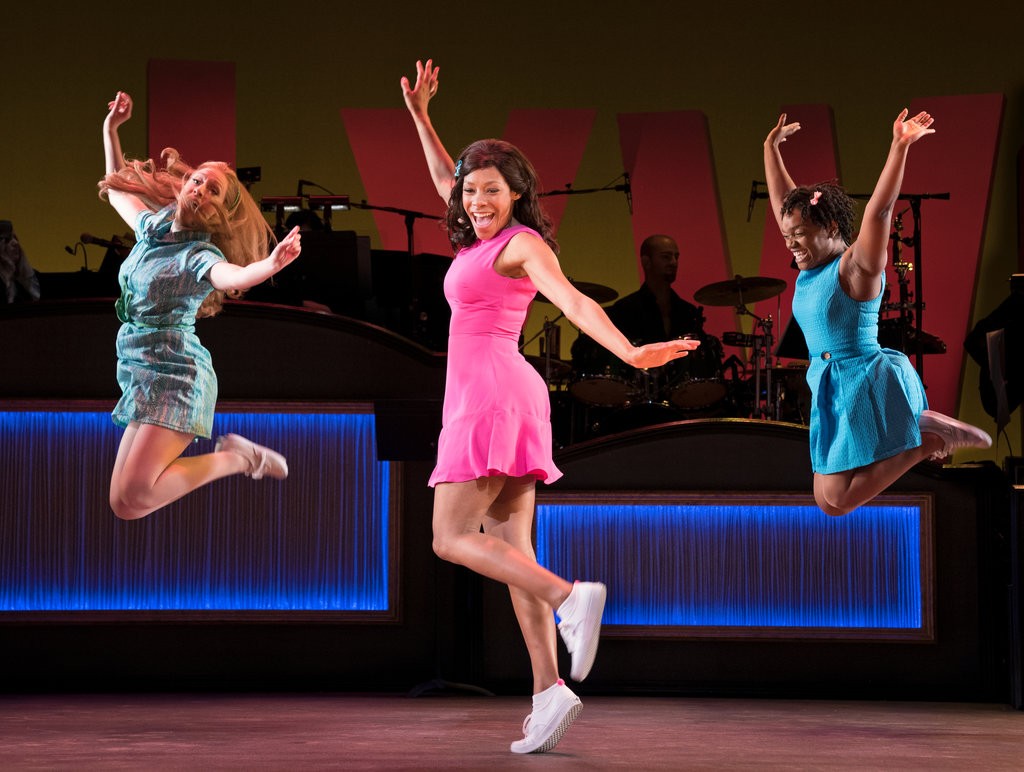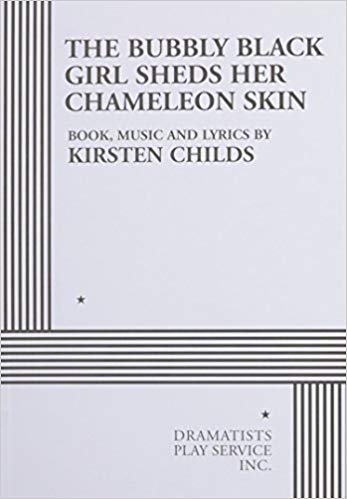The Bubbly Black Girl Sheds Her Chameleon Skin is a musical that was originally produced in 2000 but drew a lot of attention in 2017 when it was performed at Encores! Off-Center in New York, which “was founded in 2013 with the mission of presenting Off-Broadway musicals that pushed creative boundaries when they were first produced.” The plot is autobiographical to the life of musician, lyricist, and writer Kirsten Childs. The music is described as funky, and the lyrics had good rhythm to them as I read, like poetry.
The show is about Viveca Stanton, a black girl growing up in California. It opens with her playing with a white doll, admitting that her mother bought her a black doll, but she shoves it under her bed. Right away, we see how she has learned from society that white is better, though her parents encourage her otherwise. Viveca finds a newspaper with the story about four black girls blown up in a church in Alabama, setting the play in the United States, 1960s. Little Viveca dreams of being a dancer, but questions of race and identity keep tripping her up.

The musical pushes forward quickly — 60s, 70s, 80s, and 90s. Each has a marker of the time, such as hippies. Though Viveca starts as a child, this isn’t a kids’ musical. The same adult actress plays Viveca the whole show. Along the way, Viveca tries to be a dancer, but she’s told who and what she is — as a black female — her whole life. At one point, she’s told to read some lines from a script. She sounds “too white” and they want her to “sound black,” so she conjures up something that’s akin to Foghorn Leghorn (because he’s southern and she thinks of black folks as southern, completely missing the point that black folks — like her — don’t sound one way) and gets the part.
Here is the end of The Bubbly Black Girl Sheds Her Chameleon Skin, when Viveca is surrounded by all those voices that have shouted at her the last 30 years, telling her her what to do, how to take life, and still smile regardless:
VOICE 1. Smile, Vivvie! Smile, smile, smile, smile!
VOICE 2. We don’t get angry, Vivica, not even in our thoughts–
VOICE 3. Just be yourself! (Smile!)
VOICE 4. And if he says something stupid, you go tsk! (but smile!)
VOICE 5. And act your age and not your color! (And smile!)
VOICE 6. But don’t go white on me, you Oreo! (Smile!)
VOICE 7. Just be yourself! (Smile!)
VOICE 8. Doll yourself up, look beautiful! (And smile!)
VOICE 9. Be one of the good ones! (And smile!)
VOICE 10. You have the right to remain silent! (And smile!)
VOICE 11. Just be yourself! (Smile!)
Although I like the lyrics, I’m not much of a musical critic, so I was left feeling puzzled. I believe this show is fast-paced, the decades smearing into one another, so I had a hard time picturing it. I’m worried that it’s so quick that audiences may miss what’s happening. I bought this musical because I liked the synopsis and we’re looking to put on four musicals every year at my theater.


It does sound like an interesting synopsis. And it touches on some very important, deeply-felt issues. Hmm…I’m wondering if the pace of the musical doesn’t allow a real exploration of them those issues?
LikeLike
My friend Charles was saying the music and the costumes would make all the difference, especially as a way to signify a change of decades.
LikeLiked by 1 person
I am certainly intrigued by this show. What is the run time? You’re right that if this musical moves too quickly the audience might not pick up the important messages. I’ve often been stuck trying to figure out what is going on in new-to-me-musicals — particularly if the sound isn’t well balanced.
When you say that you put on 4 musicals a year, what does that entail? For example, a theatre I’m familiar with puts on “two musicals a year”, but that means they have big production musicals. They might still do something smaller or more intimate like The Last 5 Years. Just curious what the guidelines are!
LikeLike
My friend Charles just told me about The Last Five Years!
I think the idea is to have 4 musicals in our upstairs theater, which seats about 209 people. That’s how we can make more money because musicals cost more to produce. I know we’ve discussed putting on a musical in the smaller theater, but I’m not sure of the logistics of cost vs. offsetting the cost of those musicals.
LikeLiked by 1 person
The Last Five Years always makes me cry. Even though I know everything that is happening and why. Also, Songs for a New World is a great musical– it’s more like an interconnected scene night done in a musical style, but it has beautiful music and wonderful vignette stories.
Some of the smaller musicals, such as Songs for a New World should be fairly cheap and simple to pull off. 4 actors, minimal set. The challenge is mostly in musicians and lights. If you like music, listen to the soundtrack!
I’ve heard Dirty Rotten Scoundrals is also a great one for a small space. Not that I’ve seen it.
LikeLike
I wonder if these smaller musicals still cost as much as the license for a large musical.
LikeLiked by 1 person
Pft. Probably, particularly if it’s a newer musical. For example, Assassins and Spring Awakening are both fairly new. But Nunsense is pretty old– I bet that would be cheaper!
LikeLike
I’m not sure what makes a musical cost X dollars. Age of the show? Cast size?
LikeLiked by 1 person
I don’t know either. I love that we’re just speculating. I’m certain we could actually find out– but, honestly, that sounds like work. XD
LikeLiked by 1 person
😂
LikeLiked by 1 person
I enjoy musicals – they can be a fun way of getting a message across or, of course, just of entertaining. But I doubt I’d be able to judge a musical by reading it. Sounds like an interesting look at how we constantly receive messages on how we should act/be, though I’m not sure that that’s particularly different for black people – I think it happens in some way or other to us all.
LikeLike
The tough thing is new musicals aren’t filmed, so I can’t see them, and I don’t want to pay for the songs in addition to the script.
LikeLike
Have you checked youtube? It looks like there are some clips on there.
LikeLike
The clips are all pretty short, sometimes so short I can’t get a sense of the song. this is common with new musicals, as they still want people to come see it on stage before it has a bunch of video recording out there.
LikeLiked by 1 person
I wish I could have seen more musicals growing up. I think we all sort of understand that music often tells a story, but to see songs come to life right before your eyes is a different kind of experience. Wonder if this one is just better on stage than paper.
LikeLike
Well, the guy who emails the script committee sort of pushed it to the side anyway. So I guess that means no one is considering it anymore.
My grandma’s would take me to musicals, and while I thought it was cool she did that, I just kind of lumped it into Granny stuff. I didn’t realize many children are not exposed to the arts.
LikeLiked by 1 person
While I don’t like musicals, I love stories that have morals at the end. Just like old-fashioned fables, these stories are intended to teach lessons.
LikeLike
It almost feels like the other characters are trying to impose lessons on Viveca, but she learns there is no one way to be a black woman.
LikeLiked by 1 person
I used to enjoy musicals as a teenager with my mum but haven’t seen any recently. I really like the message behind this musical and Viveca sounds like a complex and interesting character. I’m making a note to keep an eye on this one, I’m always in for a good story. 😊
LikeLike
Lately, I’m just interested in all new musicals. I’m so tired of the old ones that are often racist and sexist. it’s hard to understand why theaters keep putting them on other than the nostalgia aspect. But think about the kind of person who is nostalgic for these old musicals…..
LikeLiked by 1 person
I could see myself enjoying this, as long as the music is good. In general, I really prefer plays without the music, mystery theatre in particular, but this sounds interesting too…
LikeLike
I prefer straight plays as well, especially ones that say something about a moment in time. I think this musical wants to say something about all the moments in time.
LikeLiked by 1 person
I’m loving the titles of these plays!
“Just be yourself”… *snort*
LikeLike
If you’re going to promote a play, these titles are awful. They have to fit on all the marketing!
LikeLiked by 1 person
True! 🙂
LikeLike